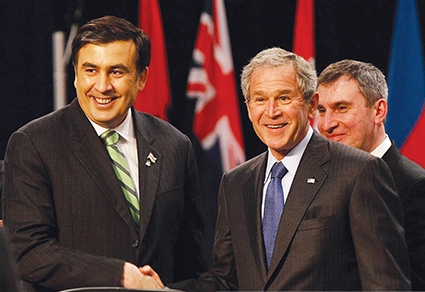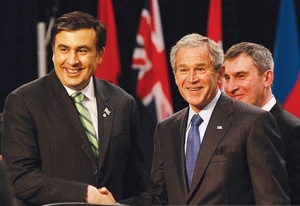Former US Ambassador to Georgia on Saakashvili, Russia and the August 2008 War
Senior US diplomat Richard Miles is one of those who over the years has garnered what can only be described as a wealth of experience and insight on political matters about countries in the post-Soviet space and particularly the South Caucasus region. Having served as Ambassador of the United States to Georgia in the penultimate years of the Rose Revolution, he knows more than most what this country is about and is just the person to ask what Georgia should expect from the major political scenarios currently unfolding in the region. Voice of America’s Nana Sajaia did just that and we are pleased to offer an extract of this exclusive interview to GEORGIA TODAY’s readers.
Two years have passed since Russia’s invasion of Crimea. Where is Ukraine today?
They are having difficulties- because of the intrusion of the mercenaries, because of their continuing activities. Despite the Minsk Agreement, the difficulties can still be seen in rather large numbers. Ukraine itself has internal difficulties. With the elections coming up, it’s going to be quite interesting to watch, and you can be sure we are keeping a careful eye on it.
With the Maidan Revolution, invasion of Crimea and now Savchenko’s trial in Russia, Ukraine has been in the international spotlight. What has it achieved?
Ukraine has a very long history, in some ways inextricably linked with Russian history, but it has enjoyed its current independence only a relatively short period of time. In many such countries, which achieved independence within the last 25-30 years, people try to work out their own political, economic and social development and at the same time try to deal with the burden of their past. And, frankly, to deal with the difficulties posed by the Russian Federation. So, there is no easy answer to the question what has been achieved or what has not been achieved in each of these countries. They are trying, for one.
Are you following President Saakashvili’s activities in Ukraine?
Yes but, to be honest, more for amusement than anything else. I find it particularly odd that a president of an independent sovereign country would go off and become governor of a province, no matter how important it might be –Odessa is an important place, I just find it really peculiar. I know president Saakashvili speaks Ukrainian, I know he had an education in Ukraine, there are certain reasons why he is there, but I do find that odd.
How realistic do you think it is to copy-paste the Georgian anti-corruption model from Georgia to Ukraine?
I’m not sure there’s any comparison. Ukraine has quite impressive industrial assets, assets of natural resources, so there are extremely large sums of money involved in the volume of trade transactions which take place in interaction with the government on a much higher level than anything in Georgia. So I don’t think you can actually compare the two situations.
Some of the most vocal critics of Saakashvili have said his actions provoked Russia in 2008. Six years later, Russia is occupying Crimea. Has that softened criticism towards Saakashvili?
I think the war in 2008 could have been avoided. In August 2004, the Georgian Armed Forces, under President Saakashvili’s leadership, attempted to intervene in South Ossetia. It did not go well and they very quickly withdrew, but not without some deaths on both sides. When then-President Bush came out in May 2005, one of the major purposes was to try to discourage President Saakashvili from any future adventures of that sort. He made the point quite bluntly to President Saakashvili in my presence twice – once privately and once in a group with his cabinet members present – that it would be an incredible political and strategic mistake for something like what happened in August 2004 to be repeated and that doing so would certainly risk Russian intervention and Georgia would be in no position to resist the might of the Russian military.
Heidi Tagliavini wrote a wonderful, thorough report and I stand behind it 100%. I have the highest respect for her. And I think anyone who still questions what happened exactly should read that report. It puts blame on both sides – on the Russian side, on the Georgian side, and a little bit on the Ossetian side.
When the Georgian Dream government came to power, one of their promises was to soften relations with Russia. How can Georgia maintain both its Western aspirations and ties with Russia given two of its regions remain under Russian occupation?
That’s more difficult now than it would have been before 2008. It can be done, there is no reason why Georgia with its geographic position cannot have a good relationship, especially an economic relationship, with Russia. In some ways there has been a continuation of economic cooperation: Russian natural gas still goes through Georgia down to Armenia; Georgian products are still sold in the Russian Federation. The situation in an economic sense has been worse than it is at present. The present government has made some effort to try to improve the relationship with Russia and it should.
Some would say the Western reaction in 2008 emboldened Russia to invade Crimea. Do you agree?
I’m sure the majority of Georgian people and the Georgian government might have preferred us to take stronger measures, but that was never on the cards.
Nana Sajaia












